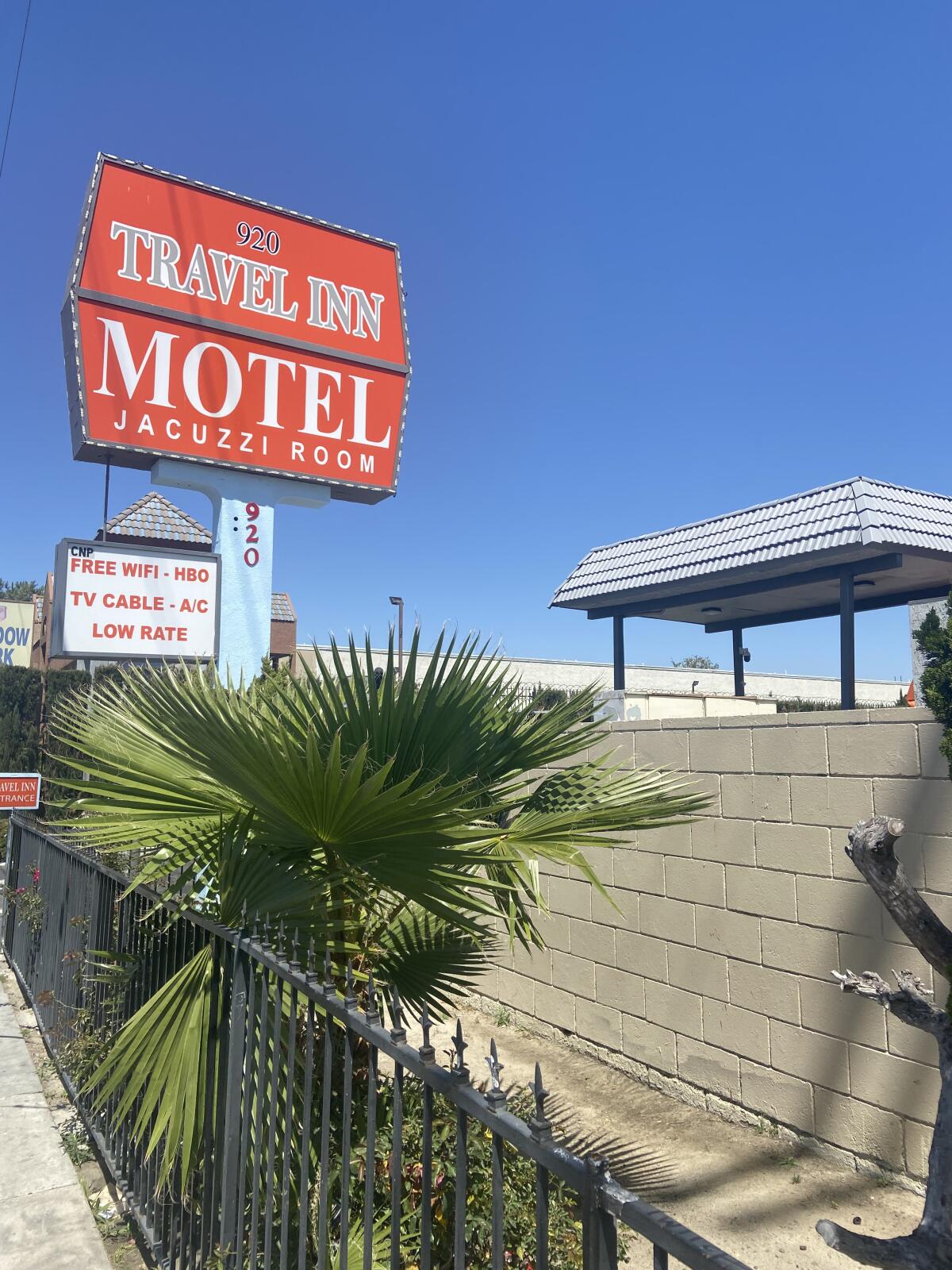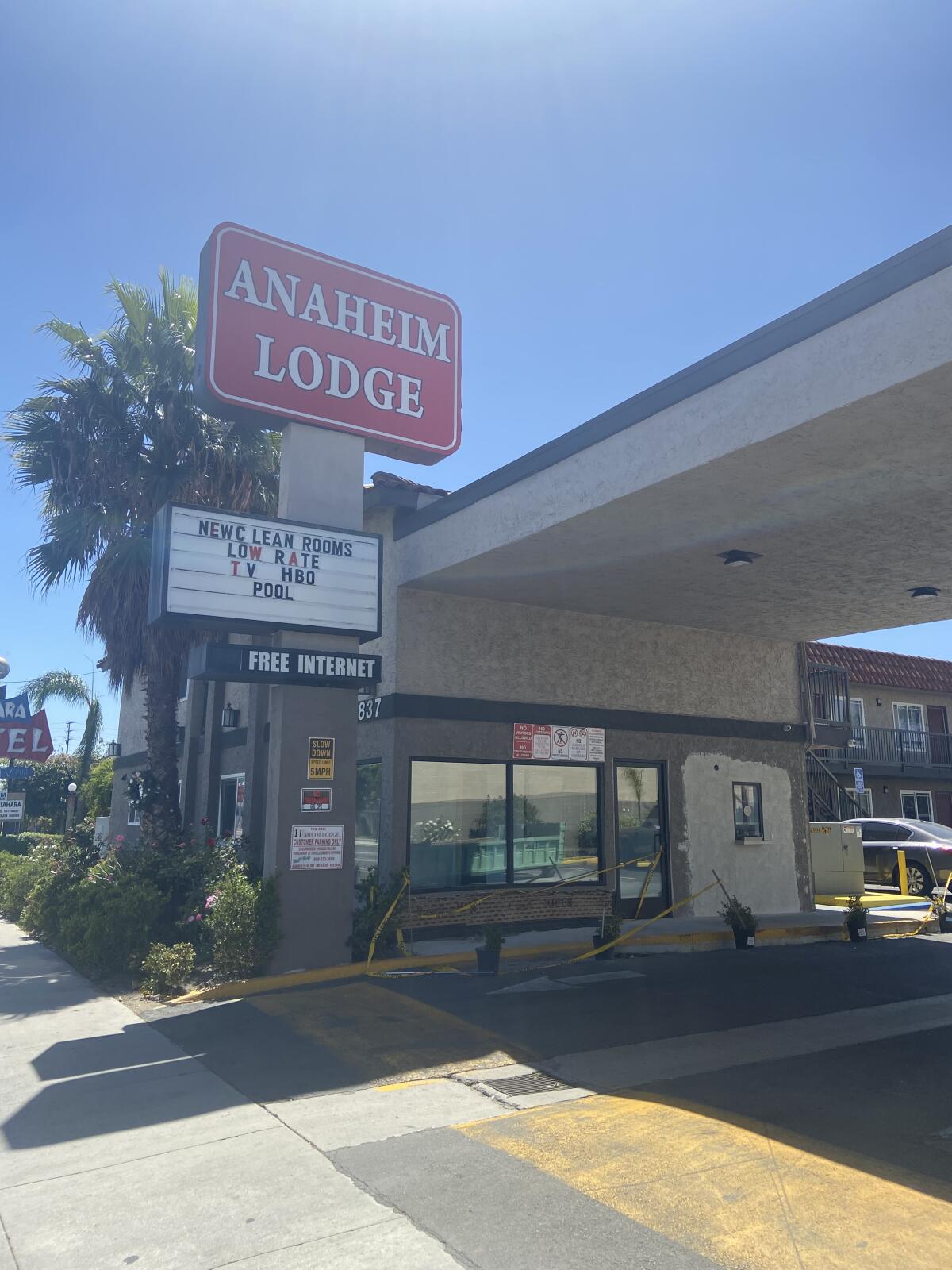Anaheim clamps down on motels accused of attracting drug dealing and prostitution

As part of the city’s efforts to revitalize a 1.5-mile stretch of Beach Boulevard, Anaheim officials have been clamping down on motels that they say draw drug use, prostitution and other crimes to the area.
Much of the commercial corridor on the iconic street that opened in 1934 to serve as a thoroughfare to Orange County’s beaches has become dilapidated. Among other development projects aimed at revitalizing the boulevard, cities including Anaheim, Buena Park and Stanton have focused on problematic motels as a means to improve the community.
This week, the Anaheim City Council voted to tighten restrictions on the Anaheim Lodge and Travel Inn. Police claimed that crime has increased at both properties in recent months.
“Much of the criminal activity along Beach Boulevard originates from mismanaged motels that facilitate an environment that is conducive to illegal activities such as drug dealing, illegal gambling halls, slap houses and prostitution,” said Ted White, director of the city’s planning and building department. “These criminal activities lead to assaults, shootings, drug overdoses, deaths, human trafficking and property crimes along the boulevard.”
The council voted to impose a series of conditions on the two motels, including creating a security and operations plan that will be renewed annually, having a manager on site 24 hours a day, daily cleaning services, a prohibition on short-duration rentals, a requirement that guests be at least 21 years old to rent a room and regular maintenance such as removing trash and graffiti.
The City Council took up the issue on Tuesday night in response to the motels’ appeal of a similar decision by the Planning Commission earlier this year. An attorney for the motels filed the appeal contending that police had entered and searched the properties unlawfully, and there was no evidence the motels were violating the law or creating a public nuisance, among other reasons.
“I don’t doubt that there may be issues that you’ve got with people living or with some of the crime areas in general, but to single out a couple of motels and then just to impose the conditions arbitrarily is not the way to go,” said attorney Frank Weiser, who is representing the motels. “Getting to the substance of what they’re doing, my clients are not opposed to voluntarily working with the city to try to update any claimed nuisance activity in the area. To that extent, I think they’ve gone beyond what they’re required to do.”

Weiser said the motels already meet a number of the conditions that were imposed this week by the city, including establishing a security and operations plan, 24-hour onsite management, daily cleaning services, a prohibition on short-term rentals and regular maintenance. He said his clients object to the city imposing the condition that gives officials the power to later revoke a business’ permit and shut it down.
Weiser also complained about the procedures of the meeting, claiming that he and his clients were never furnished with the “documentary evidence” the city used in making claims against the motels.
“How am I supposed to rebut a charge in which I see no documentary evidence?” he said. “... It seems so fundamentally clear that that’s just a violation of due process.”
The City Council was not swayed by Weiser’s argument and approved the conditions 6-0, with Councilman Jose Diaz recused. Councilman Jose Moreno said it is within the council’s responsibilities to rein in problematic businesses.
“If they become a nuisance and a danger to public health and safety under the metrics that we use, then that does warrant specific attention,” Moreno said. “We’re moving towards modifying to better secure the health of that community and improve it under the rebuild Beach [Boulevard] that we’re trying to do. So yes, it is to the city’s benefit that that stretch of the boulevard becomes safer.”
Buena Park and Stanton are also investing in the revitalization of the boulevard.
Buena Park has purchased motels and replaced them with restaurants, modern hotels and other attractions. Stanton has also purchased motels and turned them into housing for homeless people through the statewide Project Homekey program, which entails purchasing and rehabilitating hotels, motels, vacant apartments and other buildings. The program was introduced by the state amid the pandemic as a way to transition homeless people to permanent housing from Project Roomkey, another pandemic-era state program that placed homeless Californians in hotel rooms to reduce the risk of COVID spread.
Anaheim is also getting involved with Project Homekey. Late last month it was awarded $26.5 million in state funding to convert a Studio 6 motel on Harbor Boulevard into affordable housing. The city also partnered with the Jamboree Housing Corp. to turn a former Econo Lodge motel on West La Palma Avenue into affordable housing for veterans, people under mental care and formerly homeless people. The property was the first of its kind in Anaheim since the city passed an ordinance in 2019 allowing motels and other commercial and office structures to be converted into affordable housing.
More to Read
Sign up for Essential California
The most important California stories and recommendations in your inbox every morning.
You may occasionally receive promotional content from the Los Angeles Times.











